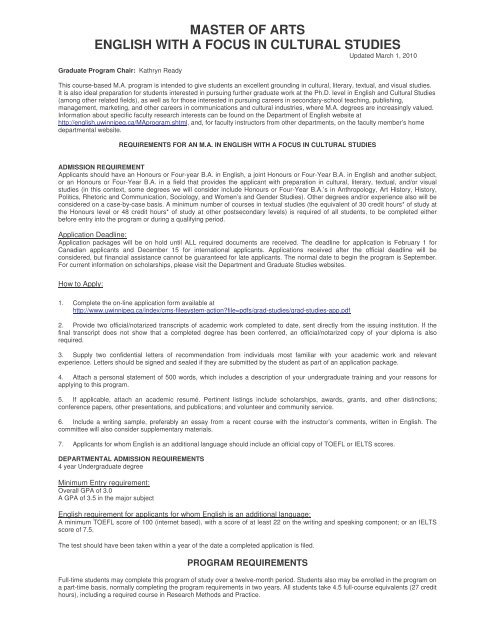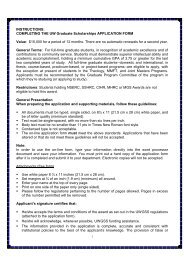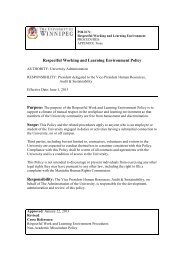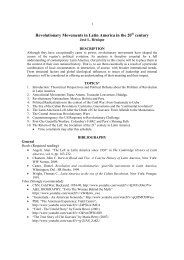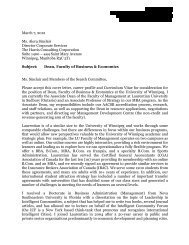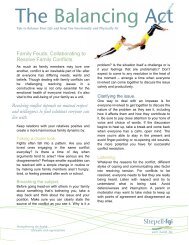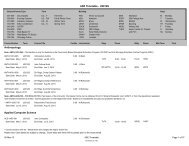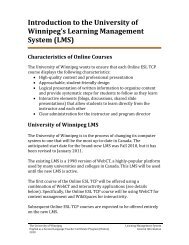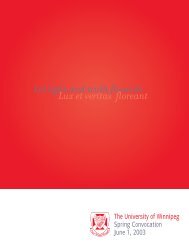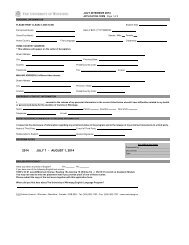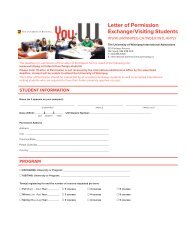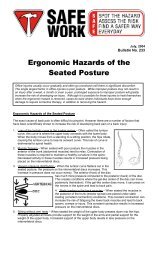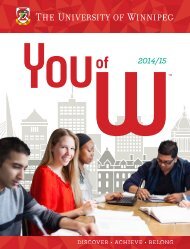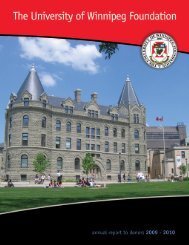MASTER OF ARTS ENGLISH WITH A FOCUS IN CULTURAL ...
MASTER OF ARTS ENGLISH WITH A FOCUS IN CULTURAL ...
MASTER OF ARTS ENGLISH WITH A FOCUS IN CULTURAL ...
- No tags were found...
You also want an ePaper? Increase the reach of your titles
YUMPU automatically turns print PDFs into web optimized ePapers that Google loves.
<strong>MASTER</strong> <strong>OF</strong> <strong>ARTS</strong><strong>ENGLISH</strong> <strong>WITH</strong> A <strong>FOCUS</strong> <strong>IN</strong> <strong>CULTURAL</strong> STUDIESUpdated March 1, 2010Graduate Program Chair: Kathryn ReadyThis course-based M.A. program is intended to give students an excellent grounding in cultural, literary, textual, and visual studies.It is also ideal preparation for students interested in pursuing further graduate work at the Ph.D. level in English and Cultural Studies(among other related fields), as well as for those interested in pursuing careers in secondary-school teaching, publishing,management, marketing, and other careers in communications and cultural industries, where M.A. degrees are increasingly valued.Information about specific faculty research interests can be found on the Department of English website athttp://english.uwinnipeg.ca/MAprogram.shtml, and, for faculty instructors from other departments, on the faculty member’s homedepartmental website.REQUIREMENTS FOR AN M.A. <strong>IN</strong> <strong>ENGLISH</strong> <strong>WITH</strong> A <strong>FOCUS</strong> <strong>IN</strong> <strong>CULTURAL</strong> STUDIESADMISSION REQUIREMENTApplicants should have an Honours or Four-year B.A. in English, a joint Honours or Four-Year B.A. in English and another subject,or an Honours or Four-Year B.A. in a field that provides the applicant with preparation in cultural, literary, textual, and/or visualstudies (in this context, some degrees we will consider include Honours or Four-Year B.A.’s in Anthropology, Art History, History,Politics, Rhetoric and Communication, Sociology, and Women’s and Gender Studies). Other degrees and/or experience also will beconsidered on a case-by-case basis. A minimum number of courses in textual studies (the equivalent of 30 credit hours* of study atthe Honours level or 48 credit hours* of study at other postsecondary levels) is required of all students, to be completed eitherbefore entry into the program or during a qualifying period.Application Deadline:Application packages will be on hold until ALL required documents are received. The deadline for application is February 1 forCanadian applicants and December 15 for international applicants. Applications received after the official deadline will beconsidered, but financial assistance cannot be guaranteed for late applicants. The normal date to begin the program is September.For current information on scholarships, please visit the Department and Graduate Studies websites.How to Apply:1. Complete the on-line application form available athttp://www.uwinnipeg.ca/index/cms-filesystem-action?file=pdfs/grad-studies/grad-studies-app.pdf2. Provide two official/notarized transcripts of academic work completed to date, sent directly from the issuing institution. If thefinal transcript does not show that a completed degree has been conferred, an official/notarized copy of your diploma is alsorequired.3. Supply two confidential letters of recommendation from individuals most familiar with your academic work and relevantexperience. Letters should be signed and sealed if they are submitted by the student as part of an application package.4. Attach a personal statement of 500 words, which includes a description of your undergraduate training and your reasons forapplying to this program.5. If applicable, attach an academic resumé. Pertinent listings include scholarships, awards, grants, and other distinctions;conference papers, other presentations, and publications; and volunteer and community service.6. Include a writing sample, preferably an essay from a recent course with the instructor’s comments, written in English. Thecommittee will also consider supplementary materials.7. Applicants for whom English is an additional language should include an official copy of TOEFL or IELTS scores.DEPARTMENTAL ADMISSION REQUIREMENTS4 year Undergraduate degreeMinimum Entry requirement:Overall GPA of 3.0A GPA of 3.5 in the major subjectEnglish requirement for applicants for whom English is an additional language:A minimum TOEFL score of 100 (internet based), with a score of at least 22 on the writing and speaking component; or an IELTSscore of 7.5.The test should have been taken within a year of the date a completed application is filed.PROGRAM REQUIREMENTSFull-time students may complete this program of study over a twelve-month period. Students also may be enrolled in the program ona part-time basis, normally completing the program requirements in two years. All students take 4.5 full-course equivalents (27 credithours), including a required course in Research Methods and Practice.
M<strong>IN</strong>IMUM COURSE AND GRADUATION REQUIREMENTSA minimum of 27 credit hours of course work is mandatory. Students should arrange their specific distribution of courses inconsultation with the Chair of the Graduate Program Committee or designate.Students are required to obtain a minimum grade of B (grade point of 3.0) in all courses presented for graduation.Students are expected to demonstrate a reading knowledge of a second language.Expected Time to Graduate: 12 monthsMaximum Time to Graduate: 3 yearsCOURSE DESCRIPTIONSENGL-7112(3) AND ENGL-7113(6) TOPICS <strong>IN</strong> <strong>CULTURAL</strong>THEORY These courses focus on such questions as: Whatconstitutes a text? How do some texts come to be valuedover others? How do questions of value relate to thedistribution of power and authority? How do socialdifferences such as race, ethnicity, class, and gender shapeand unsettle cultural production and consumption over time?How may “cultural theory” and “critical theory” be situated inrelation to one another?ENGL-7160(3) AND ENGL-7161(6) TOPICS <strong>IN</strong> CULTURES<strong>OF</strong> CHILDHOOD These courses focus on such questionsas: How has the subject category of “the child,” different indifferent times and places, been used to secure definitions ofclass, nation, history, and the modern individual? How dodigital, filmic, and television texts, texts of material culturesuch as toys and video games, and oral texts such as familystories and schoolyard games take up and reframe thesedebates? How does studying texts designed for youngreaders allow for theoretical investigations into themanufacture of consent in liberal democratic cultures?ENGL-7901(3) AND ENGL-7902(6) TOPICS <strong>IN</strong> GENDERS,SEXUALITIES, AND CULTURES These courses focus onsuch issues as: the relationship between feminist theory,queer theory and literary and cultural production; the impactof queer theory on historical considerations andcontemporary understandings of sex, gender and sexuality;the continued relevance of feminism and feminist theory toquestions of gender and sexuality; and the development andcirculation of terms such as "homosexual" and"heterosexual" and concepts such as "masculine" and"feminine," categories that have a fundamental impact onhow we organize and understand cultures, subjectivities, andknowledges.ENGL-7740(3) AND ENGL-7741(6) TOPICS <strong>IN</strong> LOCAL,NATIONAL, AND GLOBAL CULTURES These coursesfocus on such topics as: the implications of globalization forCanadian and Aboriginal texts and identities; the potential fordialogue and collaboration across nations and cultures; theways in which local histories and contexts engender differentrelations to the global; and the language of human rightsENGL-7811(3) AND ENGL-7812(6) TOPICS <strong>IN</strong>MANUSCRIPT, PR<strong>IN</strong>T, AND DIGITAL CULTURES Thesecourses will focus on such topics as: historical andcontemporary theoretical debates over aesthetics andculture; archiving and public memory; orality and writing;popular cultures and reading publics; copyright andcensorship; manual, industrial, and digital publishing; bookproduction, distribution and consumption; and mediainstitutions.ENGL-7122(3) AND ENGL-7131(6) SPECIAL STUDIES <strong>IN</strong><strong>CULTURAL</strong> THEORIES AND PRACTICES These coursesencourage students to consult with interested facultymembers from English and cognate departments to developreading courses related to particular areas of culturaltheories and practices. Individualized programs forcompleting the required course work as well as independentstudy projects are submitted to be approved by the EnglishGraduate Program Committee. Cognate departments mayinclude the following, among others: Anthropology; Politics;Sociology; Philosophy; History; Rhetoric, Writing, andCommunications; and Women’s and Gender Studies.ENGL-7103(3) RESEARCH METHODS AND PRACTICEThis course aims to equip students with advancedbibliographical and research skills that will support theirgraduate study. Such resources will include archival, library,web-based and informational technologies, and willincorporate theoretical and applied methodologies. Eachyear course material will be integrated with other graduatecourses being offered, and might include a practicum in localcultural projects and communities.


